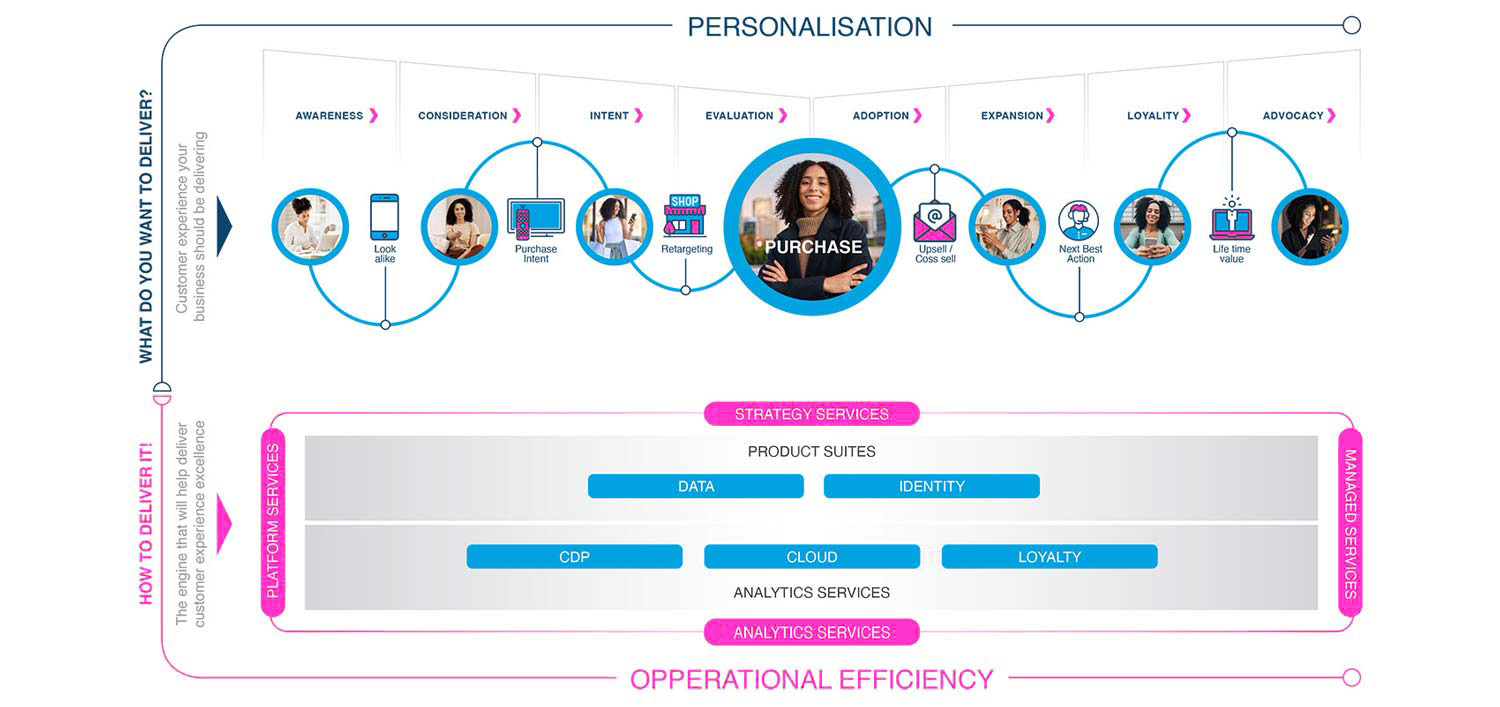Retail marketing solutions
As buying expectations, habits and technologies evolve, retail marketers today know that change and disruption are inescapable truths.
Far from being fearful of this shift in the retail landscape, retail marketers who look at change and disruption as opportunities to evolve and advance their offerings, will be those who reap the rewards. After all, retail is one of the strongest growing sectors globally, with sales expected to reach $32.8 trillion by 2026¹.
Creating a seamless retail customer experience – one that’s personalised to the individual across all channels, on and offline – is core if retailers are to remain relevant and succeed in a changing retail market. Although buying habits have evolved, people have not; we all expect meaningful engagements with brands who recognise us, however we interact.

And, with access to the right, unsiloed data, retail marketers can deliver just that; to create an accurate 360-degree view, and deliver exceptional omnichannel experiences in an ethical, intelligent and transparent way.
So what brand engagement responses will resonate most strongly with consumers, and how can brands innovate to meet these in the near future?

Identify high-value consumers through spend behaviour
Acquire more profitable customers
Today’s customer landscape is evolving. The buyer journey has shifted, and engagement strategies must adapt to keep pace. Acxiom’s suite of acquisition programs empowers brands to pinpoint and attract the most valuable audiences, driving effective customer acquisition and relationship marketing.
Understand the market for a competitive edge
Brands that understand what their customers truly value can design products and services that meet demand while targeting marketing efforts with precision. This not only improves customer acquisition but also boosts retention and drives growth across every channel. Accurate, customer-level insights are key to delivering personalised experiences, increasing sales, and maximising marketing ROI.
For decades, Acxiom has been delivering customer intelligence solutions to enhance customer experiences, with InfoBase at the forefront in offering comprehensive consumer insights. InfoBase provides actionable insights across the entire marketing ecosystem while ensuring robust identity protection.
Through a partnership with Affinity Solutions, InfoBase Purchase Transactions adds a new dimension by offering detailed transactional insights on over 10 million UK cardholders, giving brands a unique view into actual spend behaviour.
The main challenges for retailers – some statistics that indicate a radical change in retail marketing is happening!
Retail marketing is undergoing a significant transformation as new technologies reshape how businesses connect with consumers. The rise of e-commerce, mobile shopping, and omnichannel experiences has pushed retailers to adopt digital solutions and integrate them into their traditional strategies. According to a study by Statista, global retail e-commerce sales will reach nearly $7.4 trillion in 2025², showing the rapid shift toward online shopping. To stay competitive, retailers are investing in technologies such as artificial intelligence (AI), augmented reality (AR), personalized shopping experiences, and data-driven marketing strategies to meet customer expectations and enhance engagement.

Retail industry challenges
At a time when brands are competing for consumers’ time and attention, getting the consumer experience right sets brands apart from their competitors.
The impact of AI on retail marketing
Artificial intelligence (AI) is playing a critical role in this evolution, enabling retailers to understand consumer behavior more deeply and make smarter marketing decisions. AI-powered algorithms analyze large amounts of customer data to deliver personalized product recommendations, optimize pricing, and automate customer service through chatbots. McKinsey reports that AI can potentially increase retail profits by up to 60%, demonstrating its growing impact on the industry. In the future, AI will continue to revolutionize retail marketing by offering predictive insights, automating inventory management, and creating hyper-personalized shopping experiences across both online and in-store channels.
As AI becomes more advanced, we can expect to see further innovation in areas such as visual search, voice-activated shopping, and real-time consumer engagement. Retailers that embrace these technological advancements will be able to deliver more tailored, efficient, and convenient experiences to their customers, driving brand loyalty and sales growth. The future of retail marketing is undeniably digital, with AI at the forefront of enabling retailers to meet evolving customer demands and thrive in an increasingly competitive landscape.


Now is the time for retailers to invest in new technologies
The advance of new technologies is creating substantial opportunities to understand and serve customers. Now is the time that retailers should prioritise new technology integration, ensuring not only their ability to build and drive data-informed experiences, but also to keep pace with competitors and stand out.
- Financial services organizations are already utilising generative AI, with 46% employing large language models (LLMs) to enhance transaction efficiency and customer service³
- 36% of retailers are investing in conversational AI and natural language processing for digital channels, with 86% aiming to use AI to enhance customer experiences⁴
- 97% of retail teams are implementing AI in their operations. The primary applications include data collection (73%), optimising marketing design (72%), and enhancing marketing deployment to engage customers (58%)⁵
- Retailers are increasingly adopting beacon technology to enhance marketing capabilities and improve customer experiences. This technology enables retailers to deliver targeted promotions, assist with in-store navigation, and gather valuable data on consumer behavior, thereby enhancing marketing strategies and fostering customer loyalty⁶
- The number of Internet of Things (IoT) active connections in the retail sector within the European Union was projected to reach 3.09 million by 2025⁷
Given the recent AI hype, it’s easy to think marketers can sit back, put their feet up, and let the machines take the wheel. No need to be concerned with prospect acquisition or customer retention when new generative AI models can do it all for us, right?
The reality is, of course, quite different. AI certainly has huge potential. Always keep in mind, AI is an umbrella term for a wide range of complex, data-driven technologies. Brands need to think carefully about harnessing their power, in conjunction with the requisite human expertise, to deliver real long-term value.


With all the hype around AI, it’s become hard to separate speculation from reality. But a new report from Acxiom, “Where AI and Marketing Collide: 2024 CX Predictions“ cuts through the noise with hard data on how brands are using AI to transform customer experiences right now.
AI can be a massive source of competitive advantage for retail marketers
As long as brands play to AI’s core strength – which is real-time processing of huge quantities of data to identify patterns – it can help them create seamless customer experiences that are personalized and engaging. By allowing them to understand what people want, need, and prefer, AI helps brands deliver experiences so relevant and respectful, people feel as if they’re finding and engaging with brands on their terms.
Imagine an AI-driven retail experience in the future: A customer enters a clothing store and is greeted by an AI-powered virtual shopping assistant that can recognize their face and mood. Using this information, combined with conversational input, data on previous purchases, predicted future style preferences, and a real-time analysis of the customer’s body shape, the assistant makes recommendations. The customer tries these on virtually, using augmented reality (AR), and the assistant analyzes the customer’s response to suggest alternatives. The transaction is ultimately completed using biometric authentication, and a drone transports the items to the customer’s home.
AI has the potential to transform almost every industry or function with which it intersects. In CX, however, there are five specific areas in which the technology is likely to have a transformative effect in the coming months and years.

Let’s take a quick look at each of them:
Immersive Shopping – the future of retail is phygital
Simulation-based technologies are changing how we view and interact with the world of commerce. While we note that it is still early in the transition from a traditional digital- or physical-only world, the borders between the two are steadily disappearing. The number of use cases is growing along with the sophistication of the tools and the readiness of the consumer market to adopt them on a widespread basis. These two factors combine to create interactive and increasingly natural-feeling experiential shopping.
Brands are just getting started using augmented and virtual reality to create interactive and highly personal shopping experiences. Examples include virtual try-ons, virtual showrooms, 3D modeling, and visual search, where people use their phones to shop the world around them by simply taking photos of an item to discover information online. The benefits of immersive shopping have the potential to be realized by both consumers and businesses. For consumers, it increases satisfaction and boosts confidence. Of the 30% of people who report using an immersive shopping experience, more than 3-in-4 (78%) were satisfied with their experience, and 73% agree it makes them more confident in their purchases when shopping online. For brands, not only is it a source of direct feedback and engagement with customers, but it also has the potential to reduce returns. At a time when companies across all industries are struggling with supply chain issues and rising costs, immersive shopping has a key role to play in driving commercial efficiency.
The interactivity of immersive shopping provides rich experiential data about customers. In a world where third-party data is growing less relevant or becoming obsolete entirely (such as cookies), this first-party data is precious to businesses. Because it’s based on direct consumer engagement, it requires less predictive data analytics and more interpretation based on firsthand experience.
Retailers are developing immersive shopping experiences that combine the best of online and in-store shopping
-

Virtual try-on
Try-on virtual products using AR/VR
-

In-store AR
Immersive in-store experiences with AR
-

Visual search
Product search and discovery using a smartphone camera
-

Virtual showrooms
Exploring digital showrooms in VR
-

3D modeling
3D digital models of real-world products
Everything is an ad platform
It wasn’t long ago marketing was rife with talk and fear of walled gardens, essentially closed advertising networks that have addressable audiences and the ability to measure ad performance within their walls (but often constrain the flow of data back to brands). However, as brands and publishers have increased their first-party data, they can also play in the addressable advertising market, with major brands creating their own media networks or smaller brands joining forces. Retail Media Networks (RMNs) are the prime example and they are proliferating quickly, expected to account for $54.85 billion in US ad spend in 2024⁸. Uber, Netflix, and even Apple are now ad networks as well.
Retail Media Networks are digital advertising platforms created by retailers that allow brands to advertise directly on the retailer’s owned media properties, such as websites, apps, in-store displays, and other digital channels. These networks provide a unique opportunity for retailers to engage their customers at multiple touchpoints, both online and offline. When we think about customer engagement, retail media networks have a direct and powerful relationship with this concept.
The digital advertising landscape is undergoing a fundamental shift
Meeting the Customer Expectations – Effective Engagement Strategies in retail marketing
Customers today have sky-high expectations of the brands they interact with. To stay ahead of the competition, retailers must have a customer engagement strategy. This strategy should focus on delivering amazing customer experiences that are frictionless and personalised. These experiences should be delivered across all interactions and stages of the customer journey.
But what brand engagement responses will resonate most strongly with consumers, and how can brands innovate to meet these in the near future?

Shining a light on ghost shoppers
The importance of recognising and communicating with the people who purchase (or are at least interested in) your products should be the cornerstone of any retail marketing strategy. Identifying in-store customers is a great way of developing a complete profile of their spending patterns and multi-channel shopping habits. This then helps guide a complete marketing strategy strategy for retail marketers — but as always, the challenge is to get the proposition right and use the data in the correct way.
There are many ways in which a retailer can connect a store sale with an individual. Options range from a comprehensive loyalty programme — such as Tesco’s Clubcard or Boots’ Advantage Card — to an email address request at point of sale. Other methods of data capture can include mobile apps, in-store Wi-Fi and even more sophisticated options such as beacons that detect presence and movement in stores. Each of these channels offers varying levels of success in terms of types of data capture, willingness of the customer to partake and level of required investment. At the other end of the scale, the ability to identify and understand “ghost shoppers” (the segment of customers who simply transact and leave without ever identifying themselves as they shop in-store) continues to be one of the most difficult challengers that retailers face.
Evaluating the effectiveness of loyalty programs
Some of the established loyalty programs do a brilliant job of knowing who, where and when customers shop — and loyalty program utilisation can be phenomenal if the value exchange is worthwhile (estimates suggest nearly 80 percent of transactions in Tesco involve the use of a Clubcard), whereas others have lower utilisation rates, and thus can be problematic for the retailer.
In stores where customers shop on a more occasional basis, data capture can be low or non-existent, meaning that large swathes (maybe even 90% or more) of transactions are carried out by people they know nothing about (the “ghost shoppers.”) Even where data capture is higher — such as in M&S where YouGov estimates 43% of regular shoppers hold a Sparks card — still well over half of transactors go untraced.
Purchase transactions – a new era in retail transaction insights
Acxiom’s data solution — InfoBase® Purchase Transactions, powered by Affinity Solutions — helps to solve this industry wide retail challenge. By merging the power of Acxiom’s consumer file InfoBase with detailed transactional spend on over 10m UK cardholders, an additional layer of unique insight can help retailers to accurately understand actual spend behaviour on not only their own customers but also that of their competitors
This will allow retailers to understand and reach their own customers to drive personalised experiences and datadriven communications for both their known and unknown customers across the right mix of channels and platforms. As well as being able to talk to their own customers, brands can now successfully communicate with those of their competitor retailers.
“Where we all spend our money is an important reflection of our consumer needs, behaviours and attitudes. This is vital customer intelligence for any brand seeking to craft relevant and highly tailored customer experiences. This transactional data offers the most authentic and dependable reflection of shifting spending patterns, and this makes a powerful combination with our core InfoBase offering to enrich our clients’ understanding of customer behaviours. By utilising this intelligence and staying attuned to evolving spending trends and behaviours, our clients can further elevate their marketing efforts, ensuring a more personalised and impactful customer journey.”
David Keens
VP Product, Acxiom

Five-stage Engagement Framework
The Acxiom Consumer Engagement team work to a five-stage framework to design, deliver and optimise CRM strategies and communications.
-
Evaluate
Evaluate the existing capabilities of your business to support your drive for internal buy-in for business wide transformation
-
Experience
Design the desired customer experience through a data led approach, incorporating a detailed view of data, tech, people and process required
-
Enable
Implement a connected technology eco-system which enables the delivery of automated, real-time and personal experiences
-
Engage
Define your communications strategy to engage directly with your consumers to drive sustainable business growth
-
Embed
Help embed any new capabilities to determine ownership and structure, optimise internal delivery processes and provide the level of expertise needed to supplement and up-skill your internal teams.
The fundamentals of data-driven retail marketing?
Today’s customer expects a high-quality, personalised and preferential customer service experience. But this can’t be delivered without the right data connections in the right places.
The value of adopting a data-driven approach to retail marketing is increasingly being recognised. Retail Marketing must focus on truly knowing each consumer as an individual and strengthening our ability to connect the dots of their often fragmented journeys, all while acting ethically when using consumer data. Retailers must build complete, 360-degree portraits of customers to recognise them as individuals and understand their buying behaviours. Consumer personas are key to relevant and personalised experiences for customers who represent high-value potential for profitability.
The ability to make these connections creates an opportunity for brands to earn customers by winning their loyalty rather than losing out on opportunities due to convenience and proximity. Competition is no longer based solely on price and location but rather the ability to create experiences that cultivate customer loyalty and brand affinity. The pressure for retailers to perform above and beyond customer expectations is higher than ever, and it is an unyielding and ever-growing factor that pervades every aspect of an organisation. Those demands make marketing strategies that include closed-loop measurement, customer recognition, omnichannel marketing and personalisation imperative for today’s brands.
However, many marketers still face challenges in implementing data-driven strategies.

Special: The 3 fundamentals of data-driven retail marketing
It’s very likely all your marketing and operational data will eventually be useful as you adopt machine learning and artificial intelligence. But is the data you’re collecting actually helping you move the needle right now? And are you collecting and curating the right data for your needs in the near future?
Key recommendations
Your own first party-data remains your greatest insight into your consumer. But if it is incomplete or inaccessible to those who need it most, those are severe barriers to true consumer recognition for personalised and relevant marketing. In addition, consumers can shun brands that don’t clearly demonstrate they know how to treat personal data in a way that meets their expectations and can even opt out of interacting with the brand entirely. Unfortunately, most retailers may not be equipped to develop their own technology solutions in-house and, even for those that are, the resource allocation to build proprietary technology for enhancing and centralising data may not be feasible. Additionally, many retailers do not have the data ethics know-how to apply ethical data use constructs to their processes for assessing and leveraging data, leaving them vulnerable to missteps that could hurt their brand and cause harm to consumers. Finally, the complete evolution of internal structures to address data silos may be a slow-moving process.
That’s why retailers who are succeeding at personalisation and omnichannel experiences are often doing so through strategic partnerships. Acxiom is a world-class leader at enabling other companies to have better access, quality and usage of their data, which makes for an ideal collaboration.

These partnerships include activities like:
Leading ecosystem-wide technology updates to centralise and utilise consumer data
cleaning, updating and streamlining data from disparate or unethical sources
providing additional data to fill in gaps and connect consumer portraits
creating universal access across platforms while maintaining privacy compliance
All of these features present a retailer’s best opportunity to acquire and access essential consumer intelligence that can be used to achieve marketing goals associated with a 360-degree view.

Ethical data use
Today, more than any time in history, data and technology fuel our day-to-day lives. Educated consumers know brands use data to increase relevance and personalisation. Frequently, however, most consumers either don’t fully understand or pay attention to notices about how data is collected and interpreted, what exactly is tracked or how that information will be used or shared — as long as they receive a better experience, are more quickly and accurately recognised and get the improved service they expect. However, get it wrong, and the consequences can range from loss of revenue, to damage to your brand reputation, even to legal repercussions.
The first step is for retailers to establish ethical practices for all aspects of the business that involve the collection and use of data. This should go beyond what is required by law and include policies and procedures that ensure data uses are fair and just to consumers. When designing marketing programs, you need to identify the value for all stakeholders, which means both your brand and your customers.
By deliberately applying an ethical construct to assess information-driven solutions, brands can leverage data to succeed in their respective marketplaces while establishing and strengthening the trust of the individuals they serve. After all, a good data-based marketing program should benefit everyone.

The right roadmap for customer success
Acxiom helps brands by offering a suite of data and identity products, technology partnerships, and consulting and managed services. All of these services are tailored to meet the specific requirements of each customer.
Acxiom gives brands the right roadmap to deliver business value and customer success at every milestone of the customer journey. We help brands with their customer engagement strategy. We help them design a roadmap to integrate data and technology across all channels. We also align and create the business strategies that join the paid and owned media worlds.
Whether the focus is acquisition, growth, retention or an extensive personalised initiative, Acxiom provides a tailored suite of solutions. These solutions are specifically tailored to meet.



